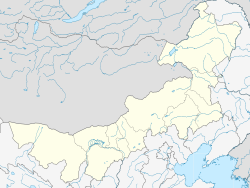Enhe
Enhe Russian Ethnic Township
恩和 | |
|---|---|
Township | |
| Coordinates: 50°49′08″N 119°54′40″E / 50.819°N 119.911°E | |
| Country | People's Republic of China |
| Autonomous region | Inner Mongolia |
| Prefecture-level city | Hulunbuir |
| County-level city | Ergun City |
Enhe is a township in Northeast Inner Mongolia under the administration of Ergun City. The township lies in the basin of the Argun River.
Demographics
The population of the Enhe is descended from mixed marriages of Han Chinese and Russians. Records of marriages between Chinese and Russians in the region date back to the 1890s from the beginning of Russian colonization of Manchuria. Unlike the conventional colonial marriage pattern of Western men marrying native women, the predominant combination in Manchuria was between Russian women and Chinese men. Mixed families are mainly settled along the towns and villages of the Argun River including Enhe, which is the only one of the settlements to be an official ethnic Russian township.[1]
Lonely Planet observes that some of the people in the township "look purely Russian".[2]
Tourism
Enhe has emerged as a tourism destination noted for its peaceful countryside backdrop. Lonely Planet describes Enhe as "a charming village brimming with an unhurried and authentic atmosphere" where "herders milk their cows outside their properties when they aren't taking them out to pasture".[2] Tourism is also enhanced by the Russian cultural ties of the township including Russian bakeries and buildings with the architectural stylings of traditional Russian wooden cottages.[3] There is also homestay accommodation in Enhe giving a representation of traditional Russian village living.[4]
There are plans to enclose the village and charge an entrance fee.[4]
See also
- Shiwei, Inner Mongolia - Neighboring town
References
- ^ Entangled Histories: The Transcultural Past of Northeast China (PDF). London: Springer. 2014. pp. 47–58.
- ^ a b "Enhe". Lonely Planet.
- ^ "Russian bread maker hopes to pass on traditional skills via local tourism industry in China's Inner Mongolia". Xinhua. September 1, 2019.
- ^ a b Pulford, Ed (2019). Mirrorlands: Russia, China, and Journeys in Between. Hurst Publishers. pp. 102–105.


